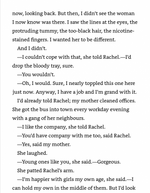Paul Whybrow
Full Member
I’ve just finished reading Kingdomtide written by Rye Curtis, which I greatly enjoyed and that will surely be turned into a film soon.
The author doesn’t use speech marks, which occasionally meant me having to re-read sections, but mostly things flowed smoothly.
Here's an example:
Your dad mentioned you want to volunteer for the Forest Service, said Lewis. Goddamn Friends of the Forest program.
The girl said nothing.
You're welcome to if that's what you want.
He told me you would be a good influence.
I don't figure he's right about that. I don't know what I'm doin most of the time.
I don't need a good influence, the girl said. I'll be eighteen in November. I plan to leave.
We’ve discussed this subject before:
https://colony.litopia.com/threads/quotation-marks—why-bother.2045/#post-33522
https://colony.litopia.com/threads/quotes-within-dialogue.1935/#post-31876
Using speech marks means it’s likely that one will make a mistake, as I’ve noticed while narrating my Cornish Detective novels turning them into audiobooks; I tend to commit an error when adding a speech mark to the end of a paragraph where the character hasn’t finished talking yet.
Quoting – the multi-paragraph rule - Baxter Communications
Also, a page looks a lot cleaner without speech marks—less cluttered and not so intimidating. I may experiment with leaving them out.
What do you think?

The author doesn’t use speech marks, which occasionally meant me having to re-read sections, but mostly things flowed smoothly.
Here's an example:
Your dad mentioned you want to volunteer for the Forest Service, said Lewis. Goddamn Friends of the Forest program.
The girl said nothing.
You're welcome to if that's what you want.
He told me you would be a good influence.
I don't figure he's right about that. I don't know what I'm doin most of the time.
I don't need a good influence, the girl said. I'll be eighteen in November. I plan to leave.
We’ve discussed this subject before:
https://colony.litopia.com/threads/quotation-marks—why-bother.2045/#post-33522
https://colony.litopia.com/threads/quotes-within-dialogue.1935/#post-31876
Using speech marks means it’s likely that one will make a mistake, as I’ve noticed while narrating my Cornish Detective novels turning them into audiobooks; I tend to commit an error when adding a speech mark to the end of a paragraph where the character hasn’t finished talking yet.
Quoting – the multi-paragraph rule - Baxter Communications
Also, a page looks a lot cleaner without speech marks—less cluttered and not so intimidating. I may experiment with leaving them out.
What do you think?


